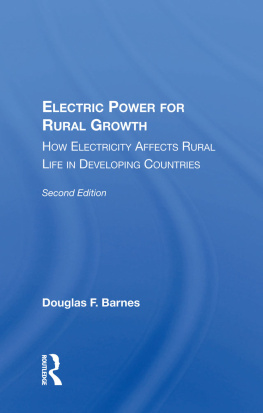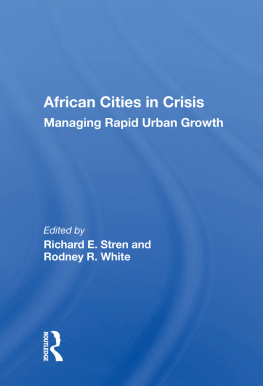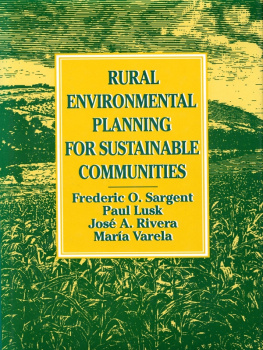
Coping with Rapid Growth in Rural Communities
Westview Replica Editions
The concept of Westview Replica Editions is a response to the continuing crisis in academic and informational publishing. Library budgets for books have been severely curtailed. Ever larger portions of general library budgets are being diverted from the purchase of books and used for data banks, computers, micromedia, and other methods of information retrieval. Interlibrary loan structures further reduce the edition sizes required to satisfy the needs of the scholarly community. Economic pressures (particularly inflation and high interest rates) on the university presses and the few private scholarly publishing companies have severely limited the capacity of the industry to properly serve the academic and research communities. As a result, many manuscripts dealing with important subjects, often representing the highest level of scholarship, are no longer economically viable publishing projects--or, if accepted for publication, are typically subject to lead times ranging from one to three years.
Westview Replica Editions are our practical solution to the problem. We accept a manuscript in camera-ready form, typed according to our specifications, and move it immediately into the production process. As always, the selection criteria include the importance of the subject, the work's contribution to scholarship, and its insight, originality of thought, and excellence of exposition. The responsiblity for editing and proofreading lies with the author or sponsoring institution. We prepare chapter headings and display pages, file for copyright, and obtain Library of Congress Cataloging in Publication Data. A detailed manual contains simple instructions for preparing the final typescript, and our editorial staff is always available to answer questions.
The end result is a book printed on acid-free paper and bound in sturdy library-quality soft covers. We manufacture these books our-selves using equipment that does not require a lengthy make-ready process and that allows us to publish first editions of 300 to 600 copies and to reprint even smaller quantities as needed. Thus, we can produce Replica Editions quickly and can keep even very specialized books in print as long as there is a demand for them.
About the Book and Editors
Coping with Rapid Growth in Rural Communities
edited by Bruce A. Weber and Robert E. Howell
This book integrates the most current research findings on the economic, demographic, fiscal, and social consequences of rapid growth in rural communities and offers strategies that can be used to mitigate the often disruptive impact of that growth. While working extensively with government officials and citizens in rural communities, Drs. Weber and Howell became aware of the need for a compilation and synthesis of the research on rural growth; they subsequently invited scholars working in selected topic areas to contribute to that effort. The resulting papers were refined during a meeting sponsored by the Western Rural Development Center, edited, and brought together in this volume. Incorporating 1980 census data, the book outlines the spectrum of changes associated with rapid growth in rural areas, presents specific options for managing rapid growth, and suggests a model that communities can use for impact assessment and for monitoring the effectiveness of various management strategies.
Bruce A. Weber is associate professor of agricultural and resource economics and an extension resource economist at Oregon State University. He was a principal contributor to the Western Rural Development Extension Center project and has conducted research and published several articles on local public finance, regional economics, and rural development. Robert E. Howell, chairman of the Department of Rural Sociology at Washington State University, has conducted research and published widely on a variety of issues concerning social impact, public affairs leadership, and adult education programs.
Coping with Rapid Growth in Rural Communities
edited by Bruce A. Weber and Robert E. Howell
First published 1982 by Westview Press, Inc.
Published 2018 by Routledge
52 Vanderbilt Avenue, New York, NY 10017
2 Park Square, Milton Park, Abingdon, Oxon OX14 4RN
Routledge is an imprint of the Taylor & Francis Group, an informa business
Copyright 1982 Taylor & Francis
All rights reserved. No part of this book may be reprinted or reproduced or utilised in any form or by any electronic, mechanical, or other means, now known or hereafter invented, including photocopying and recording, or in any information storage or retrieval system, without permission in writing from the publishers.
Notice:
Product or corporate names may be trademarks or registered trademarks, and are used only for identification and explanation without intent to infringe.
Library of Congress Cataloging in Publication Data
Main entry under title:
Coping with rapid growth in rural communities.
(A Westview replica edition)
Revised papers presented at a symposium held in Scottsdale, Ariz.
in 1980.
Included bibliographical references and index.
1. Rural development--United States--Congresses. I. Weber,
Bruce A. II. Howell, Robert E.
HN90.C6C675 1982 307'.14 82-8637
AACR2
ISBN 13: 978-0-367-02009-5 (hbk)
Contents
. John M. Wardwell and Annabel Kirschner Cook.
. F. Larry Leistritz Steve H. Murdock Arlen G. Leholm
. Steve H. Murdock, F. Larry Leistritz and Eldon Schriner
. James A. Murray and Bruce A. Weber
. Charles F. Cortese
. William R. Freudenburg
. Stan L. Albrecht
. Richard Barrows Marj Charlier
. Ronald L. Little Richard S. Krannich
. Robert E. Howell Bruce A. Weber
- Chapter 1
- Chapter 2
- Chapter 3
- Chapter 4
- Chapter 7
- Chapter 9
- Chapter 10
- Introduction
- Chapter 1
- Chapter 7
- Chapter 10
Recent research has begun to provide a more focused picture of the complex economic, demographic, fiscal, and social changes associated with rapid growth in rural communities. This book is a synthesis of current research on these important and frequently misunderstood topics. It also provides a synopsis of management options and organizing strategies which can be employed to mitigate the impacts of rapid growth. Our goal is to provide analysts, government officials, and interested citizens with the information they need to evaluate impact documents and to design strategies for managing growth and mitigating expected growth impacts.
Although several recently published books summarize the impacts of rapid growth, we believe this volume is unique. We have attempted to (1) integrate in a single volume the identification of social and fiscal impacts with the analysis of management alternatives, and (2) present relevant current research findings in a way which is accessible to local public decisionmakers. Because of the expertise and diversity of the contributors, we believe that the book has considerably more breadth and depth in the treatment of demographic, economic, social, and fiscal impacts than similar books on rapid growth.








